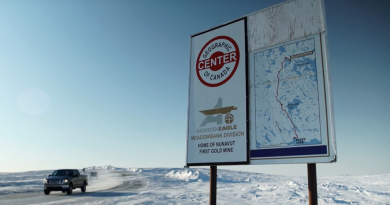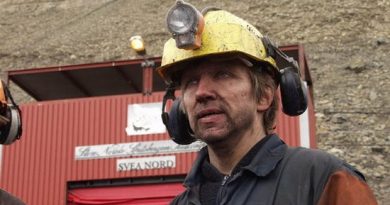NTPC using 1.3 million litres of diesel/month to meet North Slave electricity demands

That’s compared to 169,000 litres of diesel to generate electricity per month in 2019
The Northwest Territories Power Corporation has been using more than seven times the usual amount of diesel to generate electricity in the North Slave as low water levels impede its hydroelectric dam system.
The Snare hydro system is a series of four hydro plants that provide power to Yellowknife, Behchokǫ̀ and Dettah. The system usually generates about 98 per cent of all the electricity needed to power those communities, but this year — it’s been a different story.
The amount of water coursing through the river is what generates electricity. Doug Prendergast, a spokesperson for the corporation, said hydro continues to provide 55 per cent of what’s needed this fall, and electricity generated by burning diesel at Yellowknife’s Jackfish power plant continues to make up the difference.
Prendergast said the Northwest Territories Power Corporation (NTPC) has been using an average of 1.268 million litres of diesel per month, from January to September, to fill the gap created by low water levels in the North Slave region. He compared that to 2019 (before the pandemic and when water levels were normal), when NTPC was using an average of 169,000 litres of diesel to generate electricity per month.
What does this mean for power bills?
Diesel-generated electricity is more expensive than hydro-generated electricity because, although hydro dams are expensive to build, the substance that powers it is water — which is free. Diesel, on the other hand, is becoming increasingly expensive.
The N.W.T. government announced a $15.2 million contribution to NTPC this summer to keep residents’ electricity bills from getting bigger, citing the low water levels and the increasing cost of diesel.
Water levels are expected to remain low this winter, said Prendergast, and he anticipates it’ll be a challenging season for generating hydro. “We did not get the hoped-for heavy precipitation in the fall that could have altered the situation somewhat,” he explained.
According to a fall fire outlook published earlier this month by Natural Resources Canada, significant rain fell west and east of Great Slave Lake for a couple of days in mid-September, but the South Slave region stayed “mostly dry” and there are still patches of extreme drought between Yellowknife and Fort Smith.
Prendergast did not say whether the territory’s investment would cover the increased cost of electricity in the territory throughout the winter months, nor would he comment on whether people’s power bills might go up.
“There are various options that could be considered and at this point, with an election underway, it wouldn’t really be appropriate to look forward in that matter,” he said. “We’ll have to talk to the new government … lay out the situation, and we’ll have to look at what the path forward looks like.”
Low water since 2022
Low water levels along the Snare hydro system have been a challenge since the fall of 2022. Prendergast said that’s when diesel generators started running consistently at the Jackfish plant in Yellowknife.
Communities in the South Slave have also been relying on diesel-generated power since early spring, because the Taltson hydro facility that serves communities in that region is being overhauled.
Prendergast said NTPC has used 2.5 million litres of diesel to power Fort Smith and Fort Resolution since May, while Northland Utilities has been supplying its own diesel to power the communities of Hay River, Enterprise and K’atl’odeeche First Nation.
Related stories from around the North:
Canada: Low water in N.W.T. means less hydro power, more use of diesel generators, CBC News



